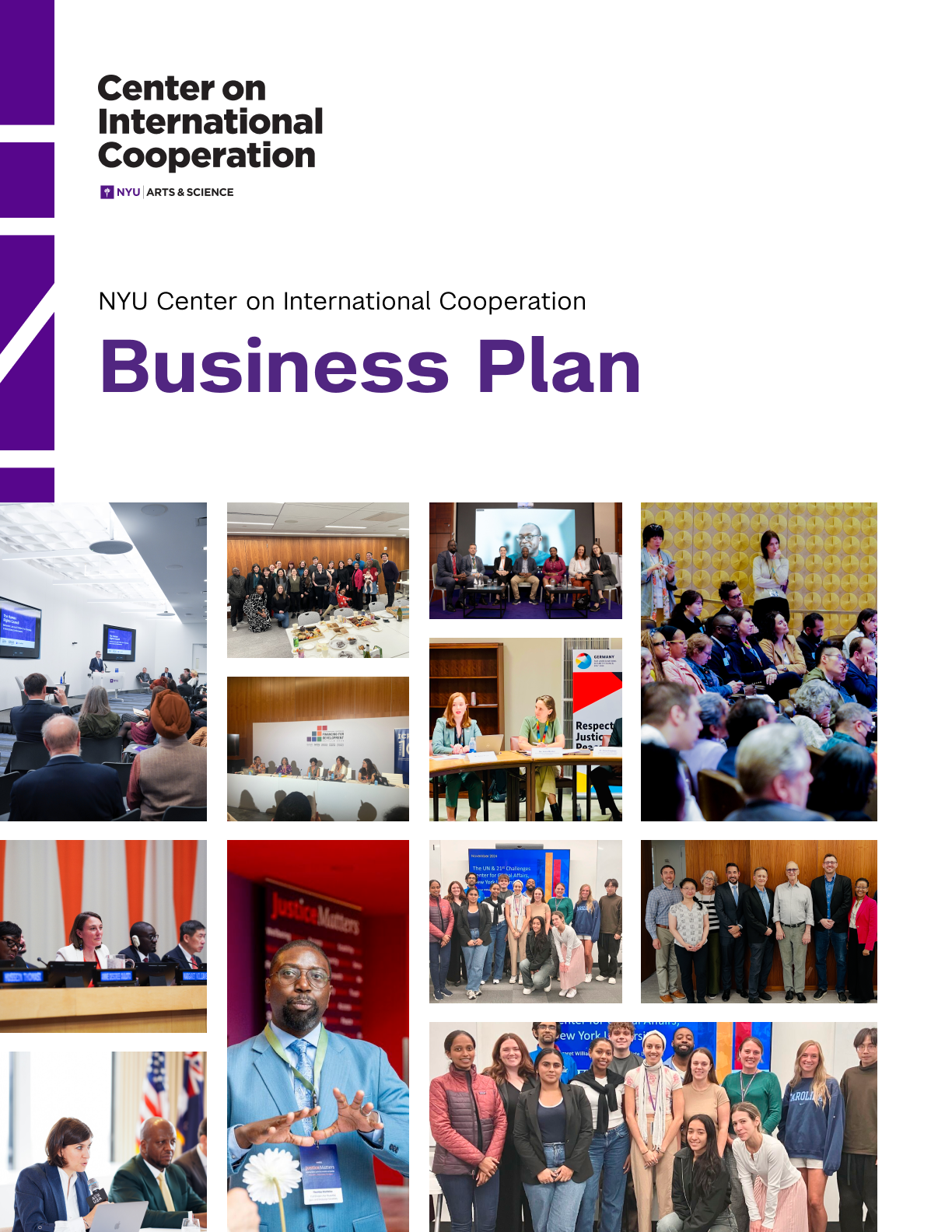
Business Plan

Our vision
Be a leading organization for the advancement of effective multilateral action through thought leadership, convening power, and innovative applied policy to prevent and respond to armed conflicts and other crises, promote equitable global governance, and build peaceful, just, and inclusive societies in an era of profound global transformation.
Our mission
CIC seeks to inform and strengthen collaboration among local and national governments, international organizations, and the wider policy community to build trust, prevent and respond to crises, and advance peace, justice, and inclusion at all levels. Download the 2025–2027 Business PlanTheory of Change
CIC advances multilateral action by the strategic integration of research, policy partnerships, advocacy, and trust-building in a divided world.
We act under the following assumptions:
Synergizing local, national, and international efforts
We leverage international platforms to amplify local and national actions while using successes at these levels to inform and drive global action. Our work recognizes that no single country can address global challenges alone. Therefore, we foster a dynamic interchange between local and national initiatives and international multilateral actions, building on a foundation of solidarity and mutual respect.
Driving collaborative action
Global challenges cannot be solved by any single actor. We believe change is most effectively achieved through the collaboration of key decision-makers in government and multilateral organizations, combined with the catalytic influence of civil society, academia, and the private sector. Trust-building is essential to this process, as it strengthens the relationships needed to create and sustain comprehensive, impactful solutions in today’s fractured multilateral environment.
Mobilizing data and evidence for action
Data and evidence are the cornerstones of our approach. We use research to build the case for change and to guide and measure the effectiveness of the solutions we’ve helped shape. Through inclusive and evidence-based dialogue, we build trust with and encourage stakeholders to take informed actions rooted in a shared understanding of today’s challenges and opportunities.
Achieving measurable outcomes
Our success is measured by the tangible changes we help realize in policy, practice, and on-the-ground impact. We set clear, actionable goals for each of our initiatives, ensuring that our efforts contribute to the advancement of peace, justice, and inclusion on a global scale. These outcomes are achieved by fostering solidarity among diverse, cross-regional stakeholders, aligning their efforts towards common goals.
Integrating functions for impactful engagement
We integrate our research, partnership, and advocacy efforts to create a unified and powerful approach to external engagement. This integrated model ensures that our messaging is consistent, our influence is maximized, and our brand as a leader in international cooperation is reinforced. Trust-building is key to this integration, ensuring all stakeholders are aligned and working together effectively.
Investing in people and knowledge
We recognize that our people are our greatest asset. We foster a culture of continuous learning, solidarity, and innovation. Additionally, we prioritize strong knowledge management and project management systems to ensure our work is efficient, impactful, and scalable.
Securing sustainable and flexible funding
We prioritize securing sustainable and flexible funding by fostering strong relationships with key partners built on solidarity and mutual trust. To maintain our responsiveness, we explore both traditional and innovative funding avenues, with a particular emphasis on securing core funding. This enables us to allocate resources where they are most needed and ensure the long-term sustainability of our mission.
Solidarity and trust-building
At the heart of our theory of change is the belief that solidarity and trust are essential to navigating and bridging divides within the multilateral system. By actively fostering these values in all our interactions, whether in research collaborations or partnerships, we aim to build a more cohesive and effective international community capable of addressing the most pressing global challenges.
Thematic programs
Promoting and Defending Multilateralism (MR Program)
The program seeks to defend and promote the values of multilateralism amid rising global tensions and polarization. Our work is guided by the belief that collaborative, multilateral approaches are essential to solving pressing global issues. The program responds through multiple interconnected areas: “Case for Action and Solutions” by advocating for multilateral solutions to global challenges; strengthening collaboration between the United Nations (UN) and Multilateral Development Banks (MDBs); and ensuring effective multilateral strategies for addressing fragility, conflict, and violence (FCV).
Prevention, Peacebuilding, and Protracted Crisis
This program supports efforts to prevent the outbreak of violence, build peace, and advance a new vision for UN peace operations. Amid declining trust in the multilateral system, the program’s objectives are to provide an evidence base for improving on-the-ground responses and influence global, regional, and national policymaking. The focus will be on developing evidence-based tools and data-driven approaches for decision-makers and practitioners, as well as their multilateral partners, and supporting the commitment made during the Pact for the Future and the 2025 Peacebuilding Architecture Review (PBAR)—building on the achievements of previous years.
Pathfinders for Peaceful, Just and Inclusive Societies
The Pathfinders program will continue to work on enhancing policies and practices that promote peace, justice, equality, and inclusion, while highlighting the interconnectedness of these areas across various sectors. Through its various teams, the program will drive a shift in international policymaking, prioritizing effective investments in peace, justice, inclusion, equality, and good governance at local, national, and global levels.
Regional programs
Congo Research Group (CRG)
In 2025–2027, CRG will continue to collaborate with Ebuteli (CRG’s research partner in the Democratic Republic of Congo [DRC]), while also expanding into new areas of work. CRG will pursue an initiative with Ebuteli focused on two interrelated issues: forging a coherent peace process in the DRC and addressing heightened geopolitical competition over Congolese natural resources between major global and regional powers. The objective of this project is to integrate international research on the DRC with local research in Congo, thereby informing international and national policy debates.
Second, CRG will seek to establish a new Africa-focused research program bringing together think tanks and research centers from across the continent. This program will examine how Africans, and African researchers in particular, are addressing questions and challenges related to the current global geopolitical climate. It will convene key African research institutions to reflect on questions including how geopolitical alignments in Africa are shifting with the influence of great and middle powers; how the emerging global geopolitical landscape will affect development and peace and security in Africa; and how multilateral institutions such as the UN, African Union (AU), World Bank, and IMF will shape the continent’s future. This new initiative will enable CRG to strategically leverage its experience in developing and implementing a research agenda with Ebuteli, promoting a continental research program anchored in Africa with a coordination structure at CIC and a foothold in the UN and the Bretton Woods institutions.
Stay Connected
Subscribe to our newsletter and receive regular updates on our latest events, analysis, and resources.
"*" indicates required fields